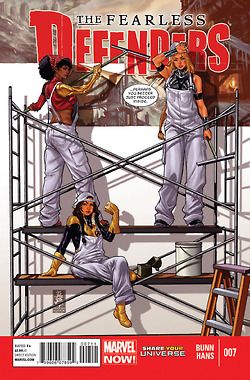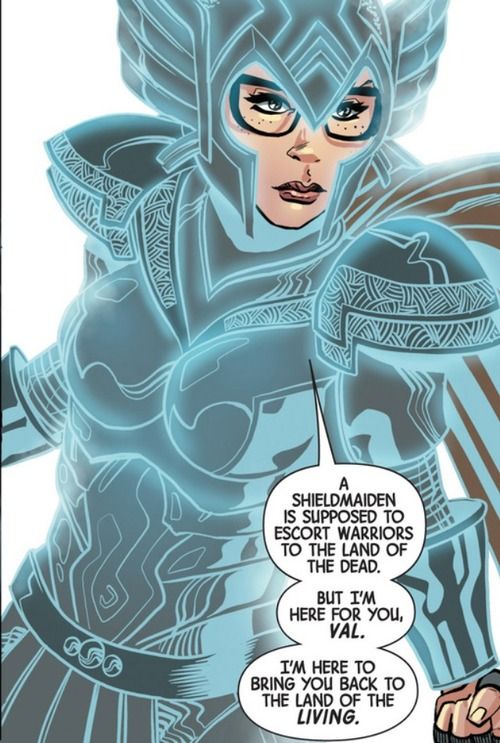Death really seems like the end, doesn't it? Aside from the very literal definition, fiction tends to end when your protagonist completes his journey. What bigger way can you end the "ultimate journey" than by dying? Sure, another character can pick up the plot and the story can continue, but where our dead character coughs his last breath is where that story ends. Characters die when their story purpose is served and there is simply nothing else to say about them.
Or at least that's what you'd assume. Comic books, however, have a really odd relationship with death. It's an eye-rolling trope that no one really stays dead anymore; in fact, I'm hard-pressed to think of something that can really and truly end a comic book character's life. At best, death temporarily shelves the character in question, pulling them out of the game to grab some Gatorade and cool off on the bench before the coach sends them back in. At worst, it's a cheap marketing trick to garner rubber necking sales and speculation. Death can be a change in status or design for a long-running character gone stale, or the cliched motivation for all the other characters around them to grieve or avenge their death. No matter what shape death takes in comics, it's pretty much a given that death is nothing more than a transitional state and that the character never really leaves us for very long.
So why do we fall for it every time? When a character dies in a comic, there's this big collective gasp from the readers as if someone actually died despite our cynical nature and regular readership. It's no surprise that eventually Peter Parker will return to the pages of a Spider-Man comic when the current status quo has run its purpose, but there is still an angry undercurrent from the Spidey fanbase about his demise. On one hand, I feel like we're the hapless victim of a playground gag, forever interested in a Hertz Donut or a nice Hawaiian Punch and falling for a gag that most of us should be calloused toward by now. On the other hand, isn't that just a sign of great writing? To take a well-worn trope and achieve fan outrage by using it constructively should be a heralded accomplishment, a difficult trick that puts us in the story despite knowing better.
Fearless Defenders pulled this trick on us with a one-two punch that must have been so hard to keep under wraps. The shock and drama from one issue was fed into the next for a unique solution, but it took 21 days for that plot point to resolve itself, long enough for a fan reaction, proclaiming to cancel their subscriptions and write angry letters online. It's hard to know what to do when you fall for the ol' Death trick one more time, especially with such a short turnaround. Let's talk abut Fearless Defenders #6 and #7 this week, and figure out if Cullen Bunn is a genius or just a jerk for pulling Death's wool over our eyes one more time.
WARNING: Yep, spoilers for Fearless Defenders #6 and #7, but since the issues have been out for at least a week, I hope they're not too spoilery. In any case, grab your copies and read along!
With this new take on the Defenders, spinning out from Fear Itself: The Fearless, we are introduced to a new character, Annabelle Riggs. She's an archaeologist, most assuredly human and a fantastic point-of-view character in the midst of Asgardian legend and the superheroics of Marvel's unsung heroines. Relatable, smart, Annabelle is an easy-to-love new addition to the all-women superhero team and, as the adventures progressed, Annabelle never stopped standing out, becoming a heroine all her own because of her humanity. By Fearless Defenders #6, when all seemed bleak and all the other heroes had fallen, it was Annabelle that took up arms and faced down the possessed Valkyrie and defeated her darker side as the Doom Maiden of rage. Sadly, it came at a cost, as Annabelle died showing love and compassion to Valkyrie, allowing her to overcome her rage but not before it took Annabelle's life.
As deaths go, it's a pretty good one. It was noble, brave and loving, showing that Annabelle's affections for Valkyrie were more than a crush and strong enough to defeat an internal and ancient evil. It wasn't gratuitous, as we see Valkyrie carry back Annabelle's body and tell the tale in complete remorse. It changed the characters and the dynamics of the team, and brought the first arc to a full conclusion. Annabelle Riggs didn't die in vain, she died to complete a narrative purpose, showing courage in adversity and a willingness to face down evil no matter the consequences. It was very well-told, and we hated it.
LGBT characters don't have the best track records in comics, and so when one passes from the printed page, people get angry. Because Cullen Bunn had done such a great job of creating a new character that his readers loved, the art of the story arc was widely forgotten in the face of our loss. I'll admit I was pretty disappointed to see Annabelle fall; since it happened so close after July 4th, I almost wrote a bit comparing her death with that of the ill-fated Freedom Ring from Robert Kirkman's run on Marvel Team-Up. The passionate masses of Tumblr were furious with Annabelle's seemingly hasty exit from the book and voiced their opinions to each other and Mr. Bunn directly. For what it was worth, he wrote a personal response to explain the dramatic purpose of the story arc to that point and asked for the readers to trust him.
A mere 21 days later, the next Fearless Defenders issue rewarded that trust with a questing Valkyrie teaming up with Clea to bring back Annabelle Riggs. Thanks to a personal sacrifice from Valkyrie, she and Annabelle now time-share a body in the best Donald Blake/Thor tradition. This is a fantastic plot twist that brings back another time-honored trope that should be fun to see play out in future pages of Fearless Defenders for those who trusted the creative team enough to keep reading. However, I must assume not everyone decided to keep reading, and I wonder how those angry readers from last issue must feel. Are they still betrayed? Do they backpedal away from the more passionate declarations of "fridging"? Have they really given up on the book after last issue's dramatic death and walked away from this plot twist? And does this new wrinkle in the story cheat us out of another opportunity for finality? Will readers be placated or will some have their trust in the narrative ruined in some fashion?
Trusting fiction is harder than it looks. Considering comics are unique in how linear they are and constantly continuing stories that will live on long after some of us are gone, there are always going to be weird twists and turns to their adventures. These twists and turns will be so constant that they will actually rewrite how this fictitious reality works. Death isn't an ending in comics; it's just a transition, and it's important to remember that as these stories and characters evolve around us. At the same time, the best writing will make us forget all of that and toss away the rules of their reality to mistake it for our own. If a horror movie makes you jump or shriek in the theaters as you watch, then it's worth the ticket to be a part of that experience; it's done its job. With the right amount of trust in the creative team, comics can be the same way.



